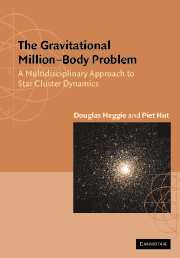Book contents
- Frontmatter
- Contents
- Preface
- PART I INTRODUCTIONS
- PART II THE CONTINUUM LIMIT: N → ∞
- PART III MEAN FIELD DYNAMICS: N = 106
- PART IV MICROPHYSICS: N = 2
- PART V GRAVOTHERMODYNAMICS: N = 106
- PART VI GRAVITATIONAL SCATTERING: N = 3
- PART VII PRIMORDIAL BINARIES: N = 4
- PART VIII POST-COLLAPSE EVOLUTION: N = 106
- PART IX STAR CLUSTER ECOLOGY
- Appendix A A Simple N-Body Integrator
- Appendix B Hints to Solution of Problems
- References
- Index
PART VII - PRIMORDIAL BINARIES: N = 4
Published online by Cambridge University Press: 05 June 2012
- Frontmatter
- Contents
- Preface
- PART I INTRODUCTIONS
- PART II THE CONTINUUM LIMIT: N → ∞
- PART III MEAN FIELD DYNAMICS: N = 106
- PART IV MICROPHYSICS: N = 2
- PART V GRAVOTHERMODYNAMICS: N = 106
- PART VI GRAVITATIONAL SCATTERING: N = 3
- PART VII PRIMORDIAL BINARIES: N = 4
- PART VIII POST-COLLAPSE EVOLUTION: N = 106
- PART IX STAR CLUSTER ECOLOGY
- Appendix A A Simple N-Body Integrator
- Appendix B Hints to Solution of Problems
- References
- Index
Summary
The following three chapters complicate the million-body problem for astronomically motivated reasons. Chapter 24 explains these by tracing the history of the discovery of binary stars in star clusters, in numbers which imply that they are primordial, i.e. they were born along with the cluster itself. They are associated with several of the remarkable phenomena which help to explain why globular star clusters are so important to astrophysicists, such as the sources of X-rays within them. We contrast their behaviour in star clusters with the much milder behaviour of binaries in less extreme environments.
In systems with many binaries, four-body encounters between two binaries are common. Chapter 25 discusses in detail one of the commoner outcomes: hierarchical triple systems. They are one class of three-body problem where the motion is both non-trivial and amenable to detailed calculation. Since these systems are stable and very long-lived, but may have tiny orbital time scales, such results are important for efficient computer simulation of N-body systems with many primordial binaries.
Chapter 26 discusses the effect of binary–binary encounters on the rest of the system. In important ways they can dominate the effect of the three-body encounters discussed in earlier chapters, though not forever, as binaries are also destroyed in these encounters. The outcomes of the interactions are also more complicated than in three-body encounters, and we show how to classify these.
- Type
- Chapter
- Information
- The Gravitational Million–Body ProblemA Multidisciplinary Approach to Star Cluster Dynamics, pp. 229Publisher: Cambridge University PressPrint publication year: 2003



